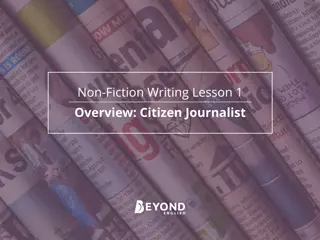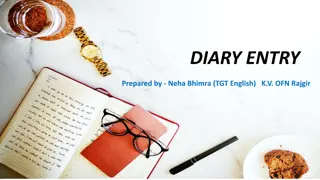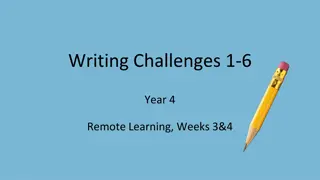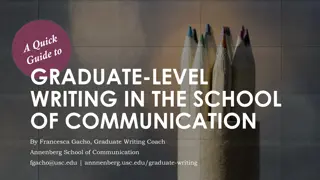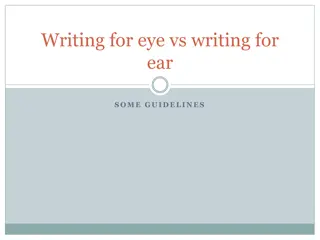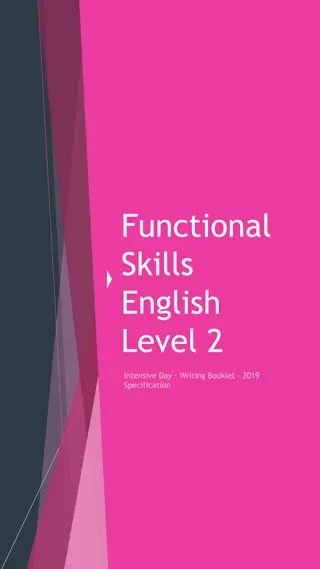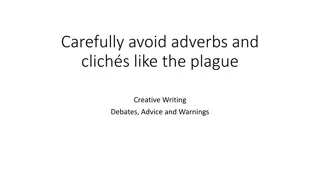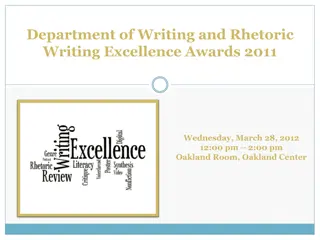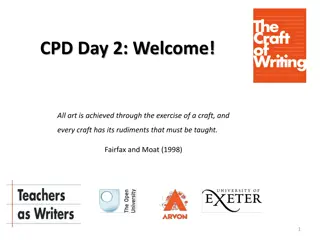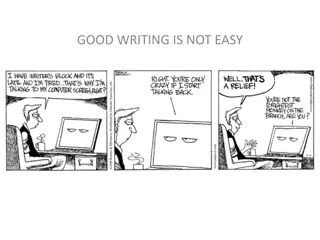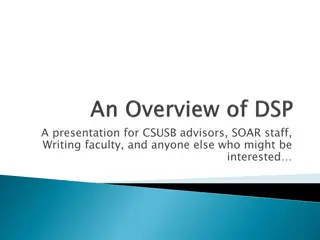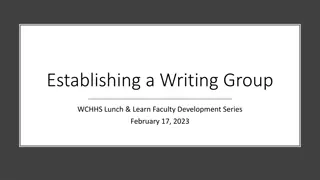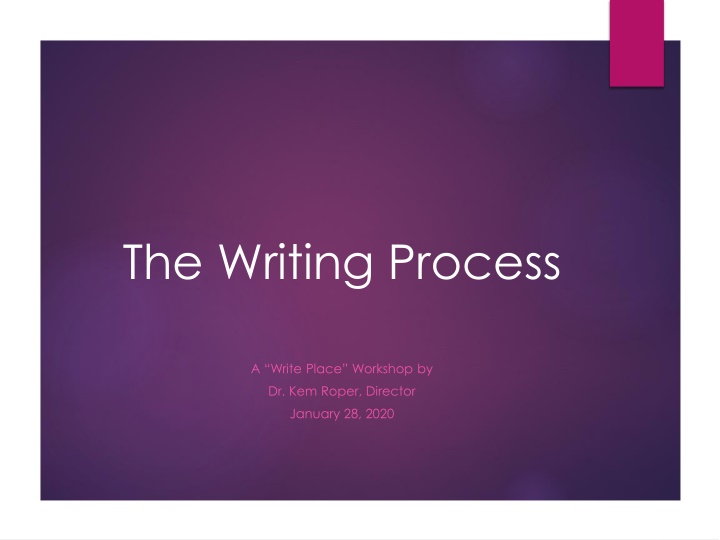
Effective Writing Strategies: A Workshop Guide for Success
Explore tips and techniques for successful writing in this workshop guide by Dr. Kem Roper. Learn to approach writing with openness, reframe negative attitudes, and manage your writing process efficiently. Discover how to plan, draft, revise, and edit your work effectively, setting yourself up for writing success.
Download Presentation

Please find below an Image/Link to download the presentation.
The content on the website is provided AS IS for your information and personal use only. It may not be sold, licensed, or shared on other websites without obtaining consent from the author. If you encounter any issues during the download, it is possible that the publisher has removed the file from their server.
You are allowed to download the files provided on this website for personal or commercial use, subject to the condition that they are used lawfully. All files are the property of their respective owners.
The content on the website is provided AS IS for your information and personal use only. It may not be sold, licensed, or shared on other websites without obtaining consent from the author.
E N D
Presentation Transcript
The Writing Process A Write Place Workshop by Dr. Kem Roper, Director January 28, 2020
Writing is an act of surrender You have to approach your writing task with an attitude of openness and expectation Set aside pre-conceived ideas or negative attitudes Don t begin by saying I m no good at this!
Also keep in mind that writing is not going away. You will have to do it again and again You might as well surrender to the process!
Try Re-framing Rather than throwing out writing all together, think about the ways that writing is useful Maybe you don t like to write essays, but in what other ways do you use writing to accomplish goals? Thinking about the value of writing in use helps to diminish the negative attitudes we may have about it Also, think about the purpose of this writing assignment. It s not just for the teacher, it s meant to teach you something!
So, how do I begin? Give yourself AT LEAST 3 days before the due date to write Give yourself a different task for each day Be free! Save editing for the last day
If you only have 3 days Day 1: think, pray, write Day 2: think, write, re- write Day 3: think, revise, edit (print & rejoice!) Space out your work! Don t try to do it all in one sitting
If you have more than 3 days Day 1-3: think, pray, write Day 3-5: think, write, re-write (read and take notes if doing research) Day 5-7: think & revise Day 8: edit, print & rejoice!
LET US HELP! The best time to come to the writing center is early in your process. We do our best work at the beginning!
Day 1: think, pray, write What is your topic? What is required? What do I already know about this? What opinions do I have about this? Where do my thoughts and opinions come from? Experiences, observations, personality, family/upbringing
Answer these questions by: Free-writing Listing (or clustering) Speaking into recorder Conversing Generate Ideas: 5Ws (journalist questions) 5 Senses (Look, Touch, Taste, Feel, Smell)
Day 2: think, write, re-write If you re writing a research paper, DAY 2 should be spent reading & taking notes on the reading (Go to the Write Place website for Powerpoint slides on research writing) If you have a long research paper to write, your day 2 may need to stretch out to day, 3, 4 and 5!
Day 2: if youre doing research Your question to yourself should be: how does this information compare to what I already know? Does it confirm, refute or enrich my understanding of this topic? Write down your answers to these questions!
If youre not doing research or once youve read and taken notes on your reading Think about what you have written and how it can be structured 1. Add to what you wrote on Day 1 can you say more? 2. To determine what to keep and what to toss, consider your purpose and audience 3.
How do I Say More? Try this! Think about the main point that you want to make Can you find a working thesis in your draft so far? Take one statement that asserts a point/perspective and follow the S.E.E.I formula to develop
S.E.E.I State write the statement Elaborate follow with an elaboration on that statement ( in other words ) Exemplify give an example that shows an actual instance of that thing Illustrate give an illustration that compares that thing to something that it s like
SEEI Example State Writing is as much about learning as it is about writing. Elaborate Thoughts come to us randomly, sporadically and at different times, so we have to take the time to think things through. Exemplify When I have a paper to write, I spend a lot of time figuring out what I want to say. My ideas are usually all over the place at first, so I have to make lists or free write for a while before I actually start. Illustrate Writing is like organizing your sock drawer. You have to dump out all the ideas first, then put them together one by one until all of the like things are together!
NOW YOU TRY! SEE-I
Organize! Once you have some stuff to work with you can begin organizing what you ve written 1. This is when a reverse outline can be very helpful 2. Now is the time to think about the structure of your essay 3. Who is your audience? 4. What does the professor require? 5.
Day 3: think, reviseedit Outline Thesis (what is my main point?) Introduction (how can I set up this discussion?) Background Information (what information would my reader need in order to know what I know?) Supporting Information (what will I use to support my main point?) details, examples, research
Draft What is a draft? Everything you write down relating to this topic What constitutes a first draft? Any ideas you put on paper regardless of form Drafts? Each time you add or delete what you ve written you re creating a new draft What constitutes a final draft? When you ve moved from revision to editing
What is a revision? Changing the content Overall idea what am I saying? Organization what is the best way to say this? Paragraphs what am I saying in each? Add to it Delete from it The purpose is to clarify your main point
Proofreading/Editing What is proofreading and editing? When your focus is not on content, but on structure Example: Sentence structure: fragments, run-ons Grammar: subject/verb agreement, verb tense, syntactical errors (comma splices, periods, question marks, exclamation points, semi-colons, commas, colons) Spelling, word choice, word usage
Reflections Evaluate your paper first before someone else does: PURPOSE (clear audience, subject, and genre) DIRECTION (proper structure, organization, logical order) IDEAS (connection to reader, specific details, variety) STYLE (expression, word choice, sentence variety, figurative language, etc...) PRESENTATION (spelling, punctuation, capitalization, paragraphing, neatness, pen or typed) Is this a good reflection of what you can do?
YOU KNOW WHERE TO FIND US! @thewriteplaceaamu @writeplaceaamu www.aamu.edu/ writingcenter Carver Complex North, Hollins Wing, Rm 125

